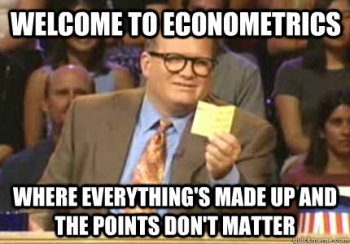After the 1920s, the theoretical and methodological approach to economics deeply changed … A new generation of American and European economists developed Walras’ and Pareto’s mathematical economics. As a result of this trend, the Econometric Society was founded in 1930 … In the late 1930s, John Maynard Keynes and other economists objected to this recent “mathematizing” approach … At the core of Keynes’ concern laid the question of methodology. Maria Alejandra Madi Keynes’ comprehensive critique of econometrics and the assumptions it is built around — completeness, measurability, indepencence, homogeneity, and linearity — is still valid today. Most work in econometrics is made on the assumption that the researcher has a theoretical model that is ‘true.’ But — to think that
Topics:
Lars Pålsson Syll considers the following as important: Statistics & Econometrics
This could be interesting, too:
Lars Pålsson Syll writes Keynes’ critique of econometrics is still valid
Lars Pålsson Syll writes The history of random walks
Lars Pålsson Syll writes The history of econometrics
Lars Pålsson Syll writes What statistics teachers get wrong!
After the 1920s, the theoretical and methodological approach to economics deeply changed … A new generation of American and European economists developed Walras’ and Pareto’s mathematical economics. As a result of this trend, the Econometric Society was founded in 1930 …
In the late 1930s, John Maynard Keynes and other economists objected to this recent “mathematizing” approach … At the core of Keynes’ concern laid the question of methodology.
Keynes’ comprehensive critique of econometrics and the assumptions it is built around — completeness, measurability, indepencence, homogeneity, and linearity — is still valid today.
Most work in econometrics is made on the assumption that the researcher has a theoretical model that is ‘true.’ But — to think that we are being able to construct a model where all relevant variables are included and correctly specify the functional relationships that exist between them, is not only a belief without support, it is a belief impossible to support.
The theories we work with when building our econometric regression models are insufficient. No matter what we study, there are always some variables missing, and we don’t know the correct way to functionally specify the relationships between the variables.
 Every econometric model constructed is misspecified. There are always an endless list of possible variables to include, and endless possible ways to specify the relationships between them. So every applied econometrician comes up with his own specification and ‘parameter’ estimates. The econometric Holy Grail of consistent and stable parameter-values is nothing but a dream.
Every econometric model constructed is misspecified. There are always an endless list of possible variables to include, and endless possible ways to specify the relationships between them. So every applied econometrician comes up with his own specification and ‘parameter’ estimates. The econometric Holy Grail of consistent and stable parameter-values is nothing but a dream.
A rigorous application of econometric methods in economics really presupposes that the phenomena of our real world economies are ruled by stable causal relations between variables. Parameter-values estimated in specific spatio-temporal contexts are presupposed to be exportable to totally different contexts. To warrant this assumption one, however, has to convincingly establish that the targeted acting causes are stable and invariant so that they maintain their parametric status after the bridging. The endemic lack of predictive success of the econometric project indicates that this hope of finding fixed parameters is a hope for which there really is no other ground than hope itself.
The theoretical conditions that have to be fulfilled for econometrics to really work are nowhere even closely met in reality. Making outlandish statistical assumptions does not provide a solid ground for doing relevant social science and economics. Although econometrics have become the most used quantitative methods in economics today, it’s still a fact that the inferences made from them are as a rule invalid.
Econometrics is basically a deductive method. Given the assumptions it delivers deductive inferences. The problem, of course, is that we will never completely know when the assumptions are right. Conclusions can only be as certain as their premises — and that also applies to econometrics.
